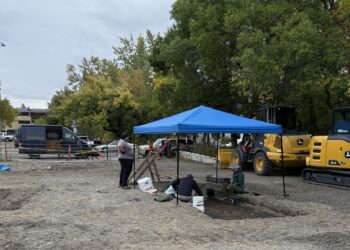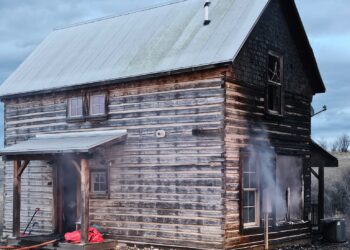By Hannah J. Ryan, Mountain Outlaw Contributor
A cold soda on a hot summer day after a hike or paddle down the river may seem like a simple pleasure. But that plastic bottle’s journey is a complicated trail that stretches thousands of miles across the United States and beyond.
If you’re pulling that chilled soda from your picnic cooler in Montana, that bottle was likely made in this state, but it will not be recycled here. A bottling company in Butte creates the vessels, and Great Falls has a plant that fills and distributes the bottled drinks for all Montanans to consume.
The majority of plastic bottles are tossed in the trash, overflowing our landfills in the last best place. Plastic bottles are estimated to take several hundred years to break down, but humankind hasn’t been around long enough to know how long it really takes. Many consist of polyethylene terephthalate (PET), which is made from petroleum and never breaks down.
According to the environmental protection agency, 55 percent of the waste that Americans generate in a year is buried. The rest is either burned or recycled. From 2009 to 2010 Montanans tripled the tons of plastic they recycled. Although this sounds positive, only 19 percent of all solid waste materials in the state were actually recycled in the last year.
Montana does not have facilities to recycle plastic, so it’s instead shipped elsewhere to be mashed into pellets that can be used in other products. A number of facilities on the West Coast and in other metropolitan areas squash plastic into reusable materials; however, much of the plastic recycled in the U.S. is sent overseas where it is hand sorted by cheap labor, said Sandra Boggs, recycling specialist for the Montana Department of Environmental Quality.
“There are a lot of concerns about transporting recycled material around the world,” Boggs said. “It’s hard to translate the energy actually saved but yes, it is energy efficient in the end when we are not filling our landfills with more new plastic.”
PepsiCo recently came out with two new eco-focused products: plant-based bottles and recycling units called Dream Machines. The new bottle is made entirely from materials like switch grass, pine bark and corn husks. Dream Machines accept cans and bottles and reward consumers on a point system for local discounts. These machines are appearing all over the U.S., but none have made it to Montana, yet. PepsiCo has committed to increase recycling of beverage containers from 34 to 50 percent by 2018.
One company founded in Billings, Floating Islands International, uses all plastic from recycled bottles in its product, but ships in recycled material from Georgia. The artificial plastic islands it produces support the weight of soil and vegetation to float in wetlands where the island’s plants filter unwanted nutrients from the water.
Anne Kania, CEO of Floating Islands International, said the idea is based on biomimicry, or using nature’s models to solve human problems.
“Our water is in such a terrible state, it needs help,” Kania said. “This is a cost-effective tool that is a sustainable way to clean up our water.”
Home Resource makes another form of recycled plastic that stays in Montana and requires little shipping. The Missoula-based company collects and sells reusable building material to reduce landfill wastes. Lauren Varney, executive director at Home Resource, said a lot of the plastics it has include black irrigation and PVC piping.
“None of this can be recycled nearby so when people pick these items up here they can be reused as garden piping or closet bars,” Varney said. “All these things we throw away have creative opportunity.”
While the story of the soda bottle goes in many different directions, it’s really a simple act on every person’s part, says Mark Nelson, president of Recycle Montana.
“To me recycling is just managing our resources, it’s no different than managing your financial resources, it all needs to be done. It doesn’t make sense to bury plastics, but it does make economic sense to recycle it.”
Hannah J. Ryan is a graduate of the School of Journalism at the University of Montana. A Wyoming native, she is fascinated by natural resource management, unbroken expanses of sagebrush prairie and any issues that impact them. For the moment, Central America holds her captivated, as she interns at the Tico Times, an English newspaper in Costa Rica. hannahjeanryan.wordpress.com













